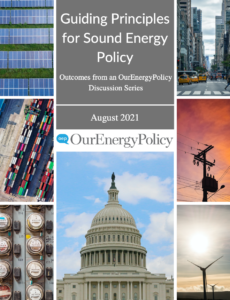Experts Identify 7 Principles To Guide Energy Policy
September 14, 2021
 Washington, D.C.: Energy experts convened by non-partisan OurEnergyPolicy (OEP) have identified seven principles that should be used by officials at all levels of government to guide the development of effective energy policies. These principles are the outcomes of an OEP initiative that began in February 2021 with a webinar opened by Congressman Paul Tonko (D-NY-20) and Senator Lisa Murkowski (R-AK) and that concluded after an expert Roundtable session in April.
Washington, D.C.: Energy experts convened by non-partisan OurEnergyPolicy (OEP) have identified seven principles that should be used by officials at all levels of government to guide the development of effective energy policies. These principles are the outcomes of an OEP initiative that began in February 2021 with a webinar opened by Congressman Paul Tonko (D-NY-20) and Senator Lisa Murkowski (R-AK) and that concluded after an expert Roundtable session in April.
Prompted by suggestions from the nationwide OEP community, the organization launched the initiative to articulate principles that could be used to guide the creation of sound energy policy, regardless of political affiliation or personal opinions. OEP convened three discussions to explore this question in-depth.
The principles that experts identified through these discussions are the following:
- Reliability – The public depends on energy to keep the economy running, especially during extreme weather events.
- Affordability – Americans depend on daily, affordable energy to function and thrive.
- Decarbonization – Climate change threatens the basic systems of modern society.
- Equity and Inclusion – Policy must take into account likely impacts on various communities and ameliorate inequities.
- Integrated Policy – Policies should be drafted with the understanding that our energy systems are interconnected; achieving one goal may affect our ability to achieve others.
- Respecting Sound Science – Energy policies should be evidence based and in harmony with the best scientific studies and data.
- Technology Neutral – To the extent possible, energy policies should take a technology-neutral, market-oriented approach, as this most efficiently promotes the continued evolution of the energy sector.
“Energy policy is extremely complex with many policy approaches and sometimes conflicting priorities,” said OEP President Bill Squadron. “The principles identified through our multi-perspective, deliberative process can act as a lodestar or point of reference as policymakers consider options and try to work through differences.”
Read more in the paper, Guiding Principles for Sound Energy Policy: Outcomes from an OurEnergyPolicy Discussion Series.
About OurEnergyPolicy: OurEnergyPolicy is a 501(c)(3) nonpartisan organization dedicated to advancing and facilitating substantive, responsible dialogue on energy policy issues and providing this discourse as a resource for the public, policymakers, and the media. OurEnergyPolicy also serves as a one-stop resource hub for all things energy policy and includes the OurEnergyLibrary—an online resource library aggregating thousands of U.S. energy policy-relevant publications from across the sector.
|
|
|||